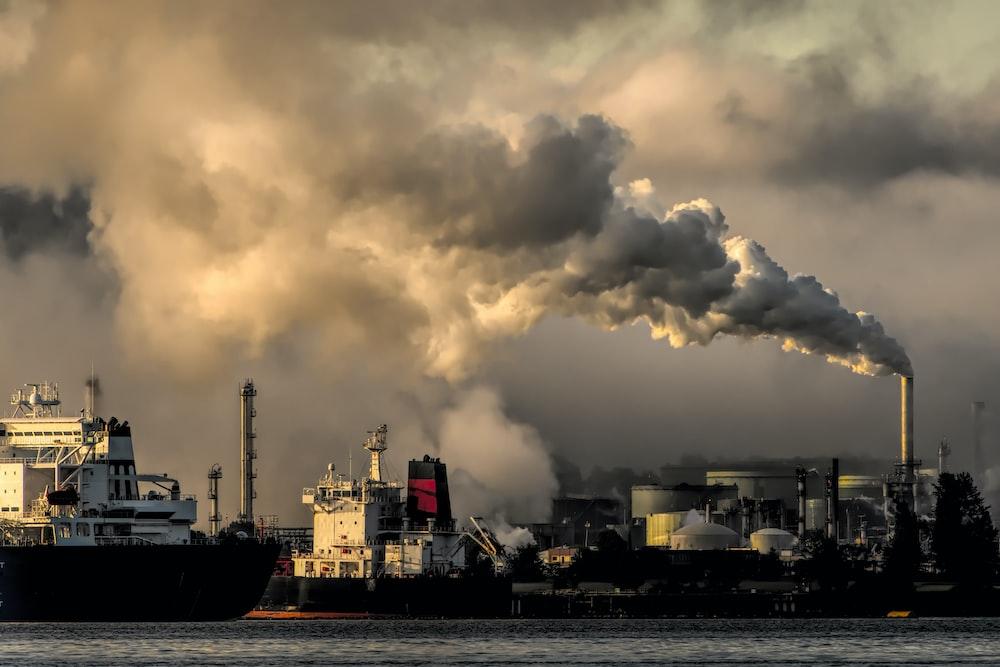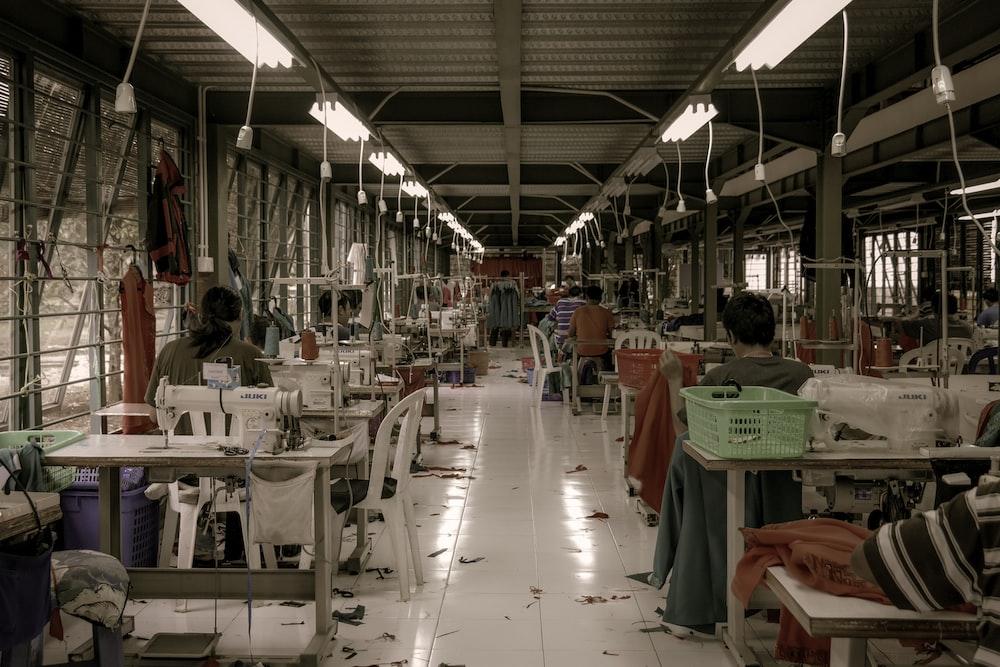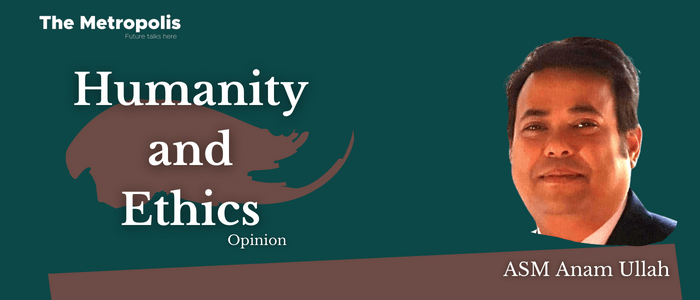Have we lost all sense of humanity? Have we lost all sense of being genuine, ethical, and honest? Are these evident in our personal, social, and political lives? Perhaps, this is the most fundamental question for almost everyone on this earth!
Ethics are a person’s principles and values to guide his/her actions and decisions to fair use. Humanity also comes from ethics. People instill ethical behavior through fairness, compassion, honesty, respect, and responsibility; hence humanity is protected. Ethics also allows people to make positive decisions based on the situation, and this can only be done by maintaining an ethical code of conduct by the state and organizational leaders, even employees and ordinary citizens.
As soon as we stay off our sense of ethics in our course of actions, it affects self, social and political morality. Therefore, it is essential to establish social ethics for social justice. Social ethics can be a systematic reflection that influences the moral dimensions of social structures, systems, problems, and communities. Therefore, social ethics can be considered a branch of “applied ethics”, the application of ethical reasoning to social issues.
Historically, the essence of “ethics” is known to us from the great Greek philosopher Socrates from 470 BC. Through Socrates’s moral discourse, the world is aware of the purpose of morality in our daily lives. However, his philosophical thoughts have had a profound and lasting impact on Western philosophy and history.
Nevertheless, people in different parts of the world have suffered greatly due to politically and economically powerful countries’ unjust political and economic aggression. People in Syria, Myanmar, and Ukraine are suffering a lot. In 2017, millions of Rohingya were displaced from Myanmar due to ethnic cleansing and sought political asylum in Bangladesh. Where is the united action to solve all these global humanitarian and political crises? These are the most complex questions we ask ourselves every day. However, there is no response from anywhere in the world to answer this question.
Unethical Military Anarchism
World War I was one of the deadliest conflicts in human history, killing more than 16 million people. Even after the deaths of soldiers, the total number of civilian and military casualties during World War I was estimated to be about 37 million people. In comparison, World War II cost far more lives than World War I, accounting for approximately 60 million lives.
Yet these two significant wars’ achievements and absolute purpose were not clear to the world’s people. Moreover, people blamed world leaders for these two ugly wars. But unfortunately, global leaders are still acting inhumanly and instigating another World War to destroy humanity and modern civilization.
After World War II, people, scholars, and global leaders were concerned about international peace and stability. Hence, the United Nations was formed on 24 October 1945 in San Francisco, California, United States, to establish peace and social justice in the world. However, how much global peace and stability this vital organization has achieved over the last 77 years has been a big question for all of us.
Cold War, the rivalry that developed after World War II between the United States and the Soviet Union and their respective allies; despite many claims that it has been over, I think it is still going on. Interestingly, a new cold war between China and the United States is again in academic discourse. According to Conte (2022), cited in Visual Capitalist, in 2021, global military spending reached $2.1 trillion, rising for the seventh year (see Figure One).

The question is whether such enormous military spending brings positive results for the citizens of those countries. I think most of the citizens of these countries do not want war but desire a healthy and happy life. Unfortunately, employment, education, and health conditions in countries with high military spending are not up to the mark. Poverty is also a big concern for them. Hence, a large military budget remains a big irony.

Critical Discourse
Let us discuss the issue of humanity and ethics from a different perspective now. Why are people, organizations, and global political leaders now more aggressive? Through the dogma and support of globalization and neoliberalism, industries in established economies have successfully removed trade barriers to lower their costs and enter new markets (mainly developing states and nations) with global rules and trade agreements designed in their favor. As a result, most of the world’s largest companies and intellectual property owners are from developed countries and have intervened in developing countries for trade and economic hegemony. As a result, their accumulation of profits can be protected by globally enforced political regimes and perpetuates income and wealth disparities.
Theoretically, when the movement of people, culture, and capital began in the 1980s, the world also witnessed political and cultural hegemony, destroying the sovereignty of nation-states, mainly economically and politically fragile states were tremendously affected. As a result, interests between individuals, organizations, and states are now more dubious and subject to unethical.
Ignorance of Global Leaders
Most developed (Western and European) nations’ political leaders/governments are seriously ignorant about the constructive socio-economic development of almost 46 developing countries worldwide. However, in many aspects, those developing nations have provided great economic and political support to the most developed nations.
46 least developing countries with about 880 million people, who account for 12 percent of the world population, have faced severe structural barriers to growth. However, least developed countries account for less than 2 percent of the world GDP and about 1 percent of the world trade. On the other hand, according to the World Bank, about 9.2 percent of the world, or 689 million people, live in extreme poverty for less than 1.90 US dollars a day, resulting in great misery in their livelihoods.
COVID-19 Pandemic Impacts
The COVID-19 pandemic threatens to reverse years of progress in the fight against global poverty and income inequality. The World Bank estimates that COVID-19 pushed an additional 97 million people into extreme poverty in 2020. Nevertheless, more than two years into the pandemic, the World Bank insists that “we still don’t know much” about its impact on global poverty in 2021-2022 or beyond.

Dilemmas for Developing Countries (Bangladesh) due to COVID-19 and Ukraine War
Bangladesh initially set a target of graduating from least developed countries (LDC) status by 2024, after a long political-economic struggle since the country’s independence on 16 December 1971. However, the COVID-19 pandemic and its dire effects obstructed its long desire to be graduated from the LDC status. However, Bangladesh has been given a new schedule to be graduated as a middle-earner country by 2026.
Nevertheless, the global political-economic situation has become very volatile due to the global economic recession caused by Russia’s political and military intervention in Ukraine on 24 February 2022, which is still in operation. As a result, it significantly affects the socio-economic conditions of a developing country like Bangladesh, which is heavily dependent on external resources and the economy. Hence, whether Bangladesh will ensure its graduation from least developed countries by 2026 is still to be determined.
Now the grave concern is that most of the developing countries are in extreme economic distress due to the unethical political decisions of the big countries. Constructive support or dialogue is needed to determine how to help those small countries because of the unexpected war crisis; however, there is no substantial sign of such initiatives from any big nations.
Not just this war crisis, when the COVID-19 pandemic reached its peak and killed millions of people, there was also no unified action to save people in the world. Developed and Economically strong countries secured their vaccines faster and more conveniently than most developing countries, including Bangladesh.
Climate Change and Its Effects on Developing Countries
Though most countries are greatly affected by climate change, the situation in developing countries is more volatile than that of developed countries. According to the European Parliament’s Committee on Environment, Public Health, and Food Safety, developing countries are more vulnerable to climate change than developed countries. In addition, climate change exacerbates the effects of population growth, poverty, and rapid urbanization in most developing countries, including Bangladesh.
The poor are likely to suffer the most from climate change; however, they are not responsible for this climate change. Without serious adaptation, climate change will push millions further into poverty and limit opportunities for sustainable development and people’s escape from poverty. In addition, climate change will likely reduce economic growth in developing countries; hence, climate change adaptation requires significant investment.
According to the European Parliament’s Committee on Environment, Public Health, and Food Safety, climate change can substantially impact the economies of developing countries. Losses are estimated at up to 20 percent of the global GDP without adaptation and mitigation. However, there has been no significant initiative from any nation to control climate change in the world and save developing countries, a symbol of the unethical leadership of global leaders.
According to the European Parliament’s Committee on Environment, Public Health, and Food Safety, adaptation is urgently needed in developing countries to reduce the impact of climate change. Reliable estimates of adaptation costs are still unavailable, but they will most likely run into billions of dollars annually. Climate change will probably affect the Millennium Development Goals (MDGs). In addition, climate change will significantly increase poverty and hunger through its impact on agriculture. Therefore, the developed world should reduce its emissions to reduce future climate change.

Globalization and Its Impact on Developing Countries (Bangladesh)
While globalization is considered a key driver of global growth and prosperity, industrialized countries rely on exports to increase their growth potential. In addition, it has helped developing countries diversify their economies and fight poverty. For example, in Bangladesh, more than six million ready-made garments (RMG) jobs have been created in the nation’s lowest-paid industry, where working conditions and workers’ fundamental rights have not been properly taken care of since the 1980s.
Nevertheless, globalization has produced both winners and losers. For example, while a country like Bangladesh needs more FDIs (foreign direct investments) to boost their employment sectors like RMG, uneven wealth distribution between developed and developing countries has begun to raise concerns. A significant criticism of globalization is that in its current form, despite its overall welfare-producing nature, it has worsened inequality within and between countries.
However, the G20 countries have false hopes of creating an income balance between developed and developing countries, which has yet to happen since their constructive commitment at the Seoul Summit in 2010.
Interestingly, and surprisingly, while Bangladeshi RMG employers are better off than RMG workers, giant global corporations, which are great allies of Bangladeshi capitalists, also benefit more from using Bangladeshi low-wage RMG workers.
For example, Walmart, a giant American retailer, made revenue of 595.6 billion US dollars for the fiscal year 2022, which is higher than Bangladesh’s national GDP (e.g., Bangladesh’s GDP in 2021 was 416.26 billion US dollars, which is less than 0.02 percent of the global economy). So now the question is if Walmart pays the correct wage to its workers in the overseas manufacturing hubs, such as Bangladeshi RMG workers, the total profit rate would significantly decrease, but it would be a more ethical business.
However, developing countries like Bangladesh are major economic drivers for most Western and European countries because these countries outsource their consumer goods, including apparel products. Unfortunately, capitalists and governments in Western and European countries pay little attention to the overall socio-economic development of developing countries.

Characteristics of Good Leaders
Good leaders should have self-awareness and credibility, focus on relationship-building between states, commit to the right action to eliminate misery and crisis, show humility, empower others, stay authentic, present themselves as constant and consistent, become role models, and be idealistic. Unfortunately, however, these philosophical thoughts are very challenging to find in global leaders’ actual course of action. As a result, problems are triggering in every sphere of human life.
Whereas governments of developed countries are blamed for their unethical practices in political-economic decisions and activities that severely affect developing countries, governments of developing countries should also be blamed. For example, an important leadership characteristic in developing countries is the leader’s exercise of willpower. The duality that is difficult to understand is that leaders want to maintain good interpersonal relationships with subordinates on one hand and act authoritatively on the other. As a result, corruption occurs between two or more vested interested groups of people, demising the fundamental rights of the ordinary citizens of the state by a great deal.
Example of a Corrupt Leadership (Sri Lanka)
Sri Lanka’s recent economic and political crisis has happened due to President Rajapaksa’s poor economic mismanagement and corruption. Research through BBC (14 July 2022) suggests that the country owes more than 51 billion US dollars to foreign creditors, including 6.5 billion US dollars to China, which has begun discussing restructuring its debt. Sri Lanka’s political and economic crisis has shown how corruption and inadequate and unethical leadership can hold a country back.
On the other hand, poverty, employment, political oligarchy, social justice, corruption, law and order situation, democracy, institutional independence and efficiency, and free and fair elections are vital issues that are seriously concerned in developing countries, including Bangladesh.
Therefore, political and organizational leaders of both developed and developing countries must adopt a unified strategy to protect humanity and be moral towards mutual enlightenment and establishment of social justice in the world, which is imperative at this time.
ASM Anam Ullah is an Australian academic, researcher, and a human rights activist



